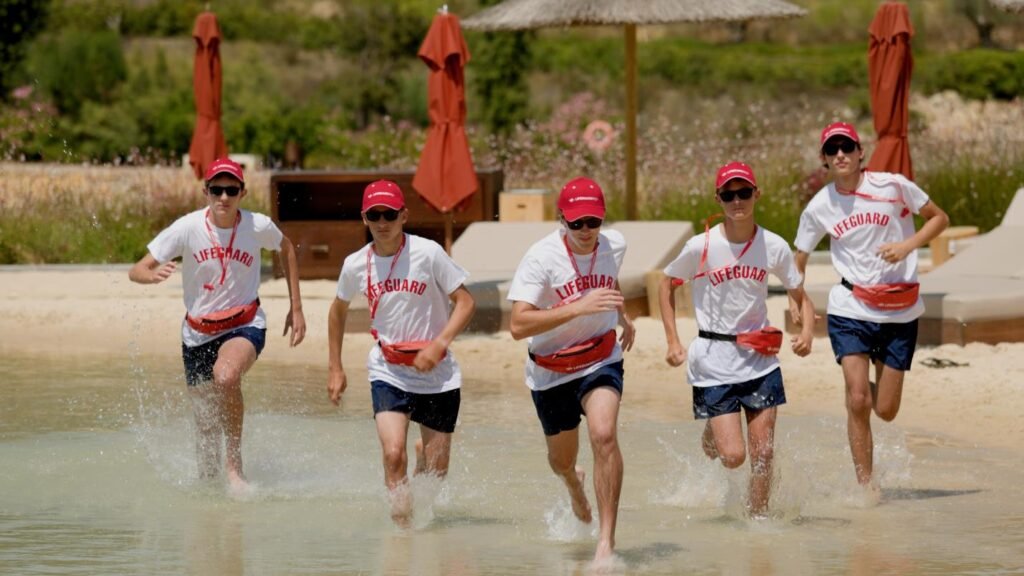Lifeguarding isn’t simply a job; it’s a calling to be a hero in aquatic environments. Whether it’s the tranquil waters of a public pool or the unique influxes of a beach, lifeguards stand as careful guardians, prepared to guarantee the safety of swimmers and supporters.
This profession requires particular training, speedy critical thinking abilities, and a profound feeling of obligation to answer swiftly in emergencies.
Role of a Lifeguard:
The essential role of a lifeguard is to keep a protected aquatic environment by preventing accidents and answering successfully during emergencies. This incorporates a great many errands, including checking exercises, upholding safety rules, giving first aid and CPR, and executing water rescues when essential.
Significance of Lifeguard training:
Lifeguard training is the foundation of readiness in this field. It furnishes people with the essential skills and knowledge expected to deal with different situations with confidence and ability. Lifeguards go through thorough training in CPR, first aid, water rescue techniques, crisis response protocols, and risk assessment.
Skills and Characteristics Required:
To flourish as a lifeguard, one should have an exceptional mix of skills and characteristics. Strong abilities to swim are principal, combined with sharp observational skills to screen swimmers’ ways of behaving and distinguish expected risks. Speedy navigation, compelling communication, and the capacity to resist the urge to panic under tension are additionally crucial traits.
Lifeguard classes Close to Me:
For trying lifeguards, finding trustworthy lifeguard classes close to them is the first step towards seeking this remunerating career. These classes are presented by certified organizations and cover an extensive educational plan custom-fitted to satisfy industry guidelines and regulations.
Lifeguard certification Interaction:
Endless supply of lifeguard training, and people should go through a certification interaction to prove their skills and status for the role. This ordinarily includes composed tests, practical assessments, and recreations of genuine situations to survey lifeguards’ capacity to answer actually in emergencies.
Obligations and Responsibilities:
Certified lifeguards shoulder significant responsibilities to guarantee safety, everything being equal. Their obligations incorporate effectively filtering the water, implementing safety rules, leading facility checks, answering immediately to emergencies, controlling first aid, and teaming up with individual staff individuals to keep a firm safe environment.
Crisis Response Protocols:
Lifeguards are prepared to follow specific protocols during emergencies to guarantee a swift and viable response. This incorporates starting rescue systems, planning with crisis administrations if required, giving beginning medical consideration, and guaranteeing seamless communication and handover of care to medical professionals.
Preventing Aquatic Accidents:
Prevention is a critical part of lifeguarding. Lifeguards proactively identify and moderate likely risks, teach benefactors about water safety practices, uphold rules like no running or making a plunge into shallow regions, and keep up with consistent carefulness to mediate before accidents happen.
Challenges Looked by Lifeguards:
Lifeguarding accompanies its portion of difficulties. These may incorporate extended periods of cautiousness, openness to differing weather patterns, taking care of difficult benefactors, maintaining centre during dull periods, and persistently levelling up abilities to remain refreshed with best practices and techniques.
Rewards and Satisfaction:
Despite the difficulties, lifeguarding offers huge prizes and satisfaction. The feeling of obligation, the opportunity to have an unmistakable effect on individuals’ lives, and the brotherhood among individual lifeguards make an exceptional and gratifying experience. Lifeguards additionally foster significant life skills like teamwork, initiative, and emergency management.
Proceeding with Education and Headway Opportunities:
Notwithstanding beginning lifeguard training and certificate, lifeguards approach continuous education and progression opportunities. These may remember specific courses for cutting-edge water rescue techniques, lifeguard management and oversight, aquatic facility activities, and initiative development. Lifeguards can likewise seek certifications in regions like pool activities, swim guidance, and aquatic wellness guidance, growing their skill set and career possibilities inside the aquatic business.
Besides, lifeguards who exhibit excellent skills, initiative capacities, and devotion might advance to higher positions like head lifeguard, aquatic chief, or even aquatics chief. These roles involve extra responsibilities, for example, staff training, booking, spending plan management, and guaranteeing administrative consistency.
Lifeguards can likewise investigate opportunities to work in different aquatic environments, for example, water parks, resorts, voyage boats, and community entertainment focuses, widening their professional experience and adding to more secure aquatic encounters for a more extensive scope of benefactors.
Community Effect and Lifesaving Inheritance:
Past the prompt responsibilities and prizes, lifeguards leave an enduring effect on their networks through their commitment to water safety and lifesaving skills. Each rescue, each fruitful mediation, and each occasion of preventing accidents contribute to a lifesaving heritage that reaches a long way past the pool or beach.
Lifeguards frequently become role models and supporters for water safety, teaching individuals of any age about the significance of swimming skills, management of kids, and perceiving likely risks in aquatic environments.
This community outreach upgrades public safety as well as cultivates a feeling of strengthening and responsibility among people to focus on water safety in their day-to-day routines, guaranteeing a more secure and more pleasant experience for every individual who appreciates aquatic exercises.
American Lifeguard Association (ALA):
The American Lifeguard Association (ALA) remains a trustworthy organization offering first-class lifeguard training and certification programs. Their courses are intended to fulfil industry guidelines and are perceived globally, furnishing lifeguards with the ability and qualifications important to succeed in their roles.
Concluding Thoughts:
Becoming a legend in aquatic environments through lifeguarding requires devotion, consistent training, and a profound feeling of commitment to safety. Lifeguards play a key role in shielding lives, advancing water safety mindfulness, and cultivating a culture of responsibility in aquatic settings.
It’s not only a job; it’s a respectable mission to safeguard and serve, making lifeguarding a satisfying and significant career decision for those energetic about having an effect in their networks.
